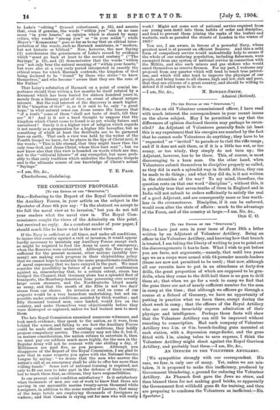THE NEW SAYINGS OF JESUS.
[TO THE EDITOR OF THE "SPECTATOR."]
SIR,—Allow me to supplement your valuable criticism of the "New Sayings of Jesus" by a brief note on the second of The phrase "kingdom of God," or "kingdom of Heaven," which occurs in it is as frequent in the New Testament as it is perplexing in its exact significance. The two great protagonists of modern criticism, Professor Harnack and the Abbe Loisy, take widely different views of its meaning. The former regards it as describing something which may be realised in this world within the soul, and speaks of it as "an inward union with the living God" ("Das Wesen des Christenthums," p. 41). The latter, on the other hand, explains it in an eschatological sense as some- thing to be realised externally and wholly in the future. " L'idee du royaume celeste," he writes (" L'Evangile et l'Eglise," p. 41), "n'est pas autre chose qu'une grande esperance, et c'est dans cette esperance qua l'historien dolt mettre l'essence de l'Evangile " ; while he adds later: " Nulle part le Christ n'identifie le royaume avec Dieu meme et sa force agissant dans le cceur des individus," thus directly contradicting Harnack on a point which both admit to be of "the essence" of Christianity, as it undoubtedly is, so that this new "Saying of Jesus," which throws much light on the question, becomes of first-rate importance. I will endeavour briefly to indicate in what way.
Harnack's view that the "coming of the kingdom" is not something wholly external and future has hitherto found its chief direct support in the remarkable saying recorded by Luke (xvii. 21) : "the kingdom of God is within you." But that Saying, which, if attested and clear, would seem to be decisive, has up to now been regarded as (1) isolated, and consequently uncertain, and (2) of ambiguous meaning. Loisy, for instance, suggests that, standing as it does alone, it is 'not genuine, but due to Luke's "editing" (travail reclactionnel, p. 55), and asserts that, even if genuine, the words "within you" can in no case mean "in your hearts," an opinion which is shared by many critics, who render "among you" or "in your midst " ; while Meyer's " Kommentar " goes so far as to say that an ethical inter- pretation of the words, such as Harnack maintains, is "modern, but not historic or biblical." Now, however, the new Saying (1) corroborates the genuineness of Luke's record by evidence which "must go back at least to the second century" (" The Sayings," p. 19), and (2) demonstrates that the words "within you" not only bear the natural meaning of "within your hearts," but were also at a very early period interpreted in exactly the ethical sense for which Harnack contends, the kingdom of God being declared to be "found" by those who strive " to know themselves," and who become " aware that they are the sons of the Father."
That Loisy's refutation of Harnack on a point of crucial im- portance should thus within a few months be itself refuted by a document which has been buried for sixteen hundred years is, merely from a literary point of view, an event of almost unique interest. But the real interest of the discovery is much higher. If the "kingdom of God" is, as it is said to be, only "a great hope," in what natural sense can Jesus assure His hearers that "of a truth" some of them "shall not taste of death, till they see" it ? And is it not a hard thought to suppose that the kingdom which Christ came to found is as yet wholly future and unrealised ? Surely it is a higher view of religion which regards it not merely as a preparation for a higher life hereafter, but as something of which at least the firstfruits are to be garnered here on earth. That such a view was held by the writer of the Fourth Gospel we know, for he places in the lips of Christ (xvii. 3) the words : "This is life eternal, that they might know thee the only true God, and Jesus Christ, whom thou hast sent" ; but we now know also that this view is founded on words which are due, not to the "editorial labours" of any evangelist, but more prob- ably to that early tradition which underlies the Synoptic Gospels and is the ultimate source of our knowledge of Christ's actual "Sayings."
Charter/louse, Godalming.















































 Previous page
Previous page